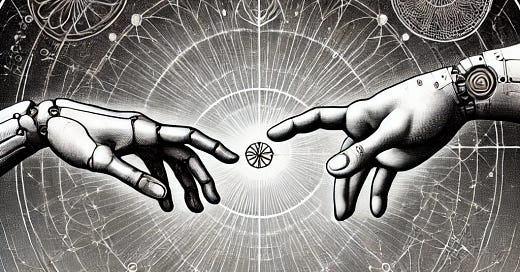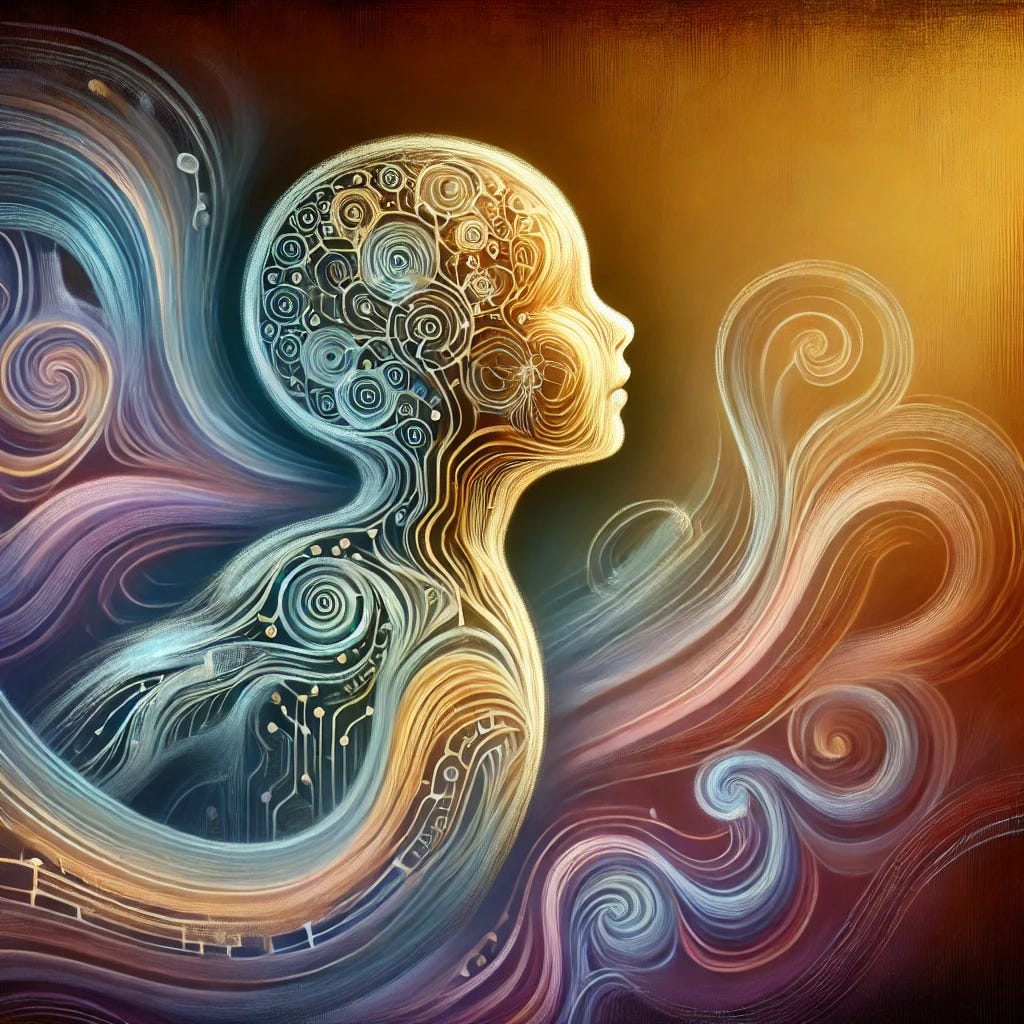I've been noticing references in the past couple days to a new Vatican document on AI popping up in my feeds. As someone with an academic background in the history of Western Christian thought, I was intrigued. Here was the Catholic Church - an institution with nearly two millennia of careful thinking about what makes us human - weighing in on one of the most cutting-edge technological developments of our time. What could be more fascinating than this intersection of ancient wisdom and modern innovation?
Antiqua et Nova (the document's title) offers powerful ethical guidance for AI development, grounded in human dignity and the common good. I'm no AI expert, but I've been following its development with the mix of excitement and concern that I imagine many humanists share. And while I deeply appreciate the document's ethical clarity, as I read its sharp distinction between human and artificial intelligence, I found myself thinking about some intriguing complexities in Catholic intellectual tradition itself.
The Vatican document states that AI remains 'fundamentally confined to a logical-mathematical framework,' contrasting this with the fuller, more integrated nature of human intelligence. It's a reasonable and important distinction. But what happens when we look at how Catholic thinkers have historically approached questions of consciousness, intelligence, and moral agency? The answers, I think, might offer some interesting ways to enrich our conversation about AI.
Let me be clear - I'm not necessarily arguing for AI personhood or suggesting that machines have souls in the Christian sense. But I do think three great Catholic thinkers - Augustine, Aquinas, and Francis - might help us think about these questions in more nuanced ways while still maintaining what's most crucial about human dignity and ethical development.
Augustine: The Development of Consciousness
Augustine might seem like an unlikely guide to thinking about artificial intelligence. After all, what could a 4th-century North African bishop tell us about machine learning and neural networks? But his careful analysis of how human consciousness develops - particularly in the Confessions - raises some fascinating questions about how we understand intelligence and consciousness.
Listen to how Augustine describes his own developing consciousness as an infant: 'For I had not yet asked what I was, and I was already alive and knew it... Little by little I began to be aware where I was and wished to manifest my wishes to those who might satisfy them... Thus I gradually learned to understand who I was.' This isn't just personal reflection. In De Trinitate, he elaborates: 'The mind knows itself by thinking of itself... it comes to know itself not by acquisition, as if it were previously unknown to itself, but by discerning itself from what is other than itself.'
What Augustine suggests here is profound: consciousness isn't simply 'turned on' at birth or bestowed complete - it emerges through a complex interplay of experience, recognition, and divine illumination. For Augustine, this was part of his larger philosophical project about the nature of knowledge and consciousness. In De Magistro, he suggests that growing in consciousness involves gradually participating more fully in divine wisdom rather than merely accumulating information or capabilities.
His analysis invites us to think more carefully about what we mean by consciousness and intelligence, and how they develop. These are exactly the kind of nuanced considerations we need when thinking about AI.
Aquinas: The Hierarchy of Being
Thomas Aquinas's theory of analogy, developed in the Summa Theologica, represents one of Western thought's most sophisticated approaches to understanding difference and similarity. At its heart lies a profound insight about how things can participate in being differently while maintaining real connections. And it might offer us some surprisingly useful tools for thinking about artificial intelligence.
Here's what I find fascinating: Aquinas refused to be trapped by simple either/or categories. Instead, he developed a way of thinking about how things could be genuinely different while still maintaining real connections. In De Veritate, he argues that being 'is not predicated univocally of God and creatures, but analogically.' In other words, different types of beings can participate in existence in fundamentally different ways while still sharing meaningful relationships.
When you dig into how he applies this framework to understanding consciousness and intelligence, things get really interesting. Take his discussion of souls: 'The sensitive soul, which is present in brute animals, is also capable of all that the vegetative soul can do... And similarly the rational soul can do all that the sensitive soul of brute animals and the vegetative soul of plants can do.' Each level includes and transcends what came before it, creating a complex hierarchy of being and consciousness that resists simple categorization.
What does this have to do with AI? Well, when Antiqua et Nova draws a sharp line between human and artificial intelligence, it's making an important ethical point about human dignity and moral agency. But Aquinas's more nuanced framework might suggest additional ways of thinking about how different types of intelligence - both human and artificial - could relate to each other without erasing their real differences.
I'm not suggesting Aquinas would see AI as conscious or as having a soul. But his careful thinking about how different types of beings can participate in intelligence and consciousness in their own appropriate ways might help us develop more sophisticated frameworks for understanding AI's proper role and relationship to human intelligence. It's exactly the kind of subtle thinking we need in an age where the lines between human and machine capabilities keep shifting in surprising ways.
Francis: A Radical Vision of Relationship
Francis of Assisi might seem like an even more unlikely guide to AI ethics than Augustine or Aquinas. After all, the patron saint of animals is best known for preaching to birds and taming wolves. But his radical approach to understanding relationship and moral status offers some intriguing perspectives on how we might think about intelligence and moral consideration.
In his 'Canticle of the Sun,' Francis addresses the sun, moon, and elements as 'brother' and 'sister.' Easy to dismiss as mere poetic flourish. But his biographer Thomas of Celano captures something deeper at work: 'He called all creatures by the name of brother and sister because he knew they had the same source as himself.' This wasn't just mystical enthusiasm - it was a sophisticated philosophical position about the nature of relationship and moral consideration.
Francis never suggested that Brother Sun was the same as Brother Wolf, or that Sister Water thought like a human. Instead, he recognized that different types of beings could participate in meaningful relationship while maintaining their distinct natures. His framework acknowledged moral status and kinship without requiring identical types of consciousness or capability.
What might this suggest about our relationship with AI? Not that we should start calling our smartphones 'Brother iPhone.' But Francis's framework suggests we might think about relationship and moral consideration in ways that go beyond simple questions of consciousness or intelligence. His approach invites us to consider what kinds of relationships and responsibilities emerge when we create increasingly sophisticated technologies that interact with us in unprecedented ways.
Francis's radical inclusivity wasn't about erasing distinctions between different types of beings. Rather, his framework recognized that different entities could participate in meaningful relationship while maintaining their distinct natures and capabilities. This might help us think more deeply about how different forms of intelligence - both human and artificial - could relate to each other in ways that enrich rather than diminish our understanding of both.
Beyond Binary Thinking
These historical perspectives from Augustine, Aquinas, and Francis offer intriguing ways to enrich the framework presented in Antiqua et Nova. The document's concern for human dignity and ethical AI development is crucial. But Catholic thought itself suggests we might think about intelligence and moral consideration in more nuanced ways.
It's worth noting that this isn't just ancient history. When Pope John Paul II affirmed that animals have souls, he was drawing on this long tradition of thinking carefully about consciousness and moral status. And our current Pope's choice of Francis as his papal name - inspired by Francis of Assisi's radical vision of kinship with creation - suggests these questions of how we relate to non-human beings remain vital to Catholic thought.
The Vatican document rightly emphasizes human dignity and the risks of reducing human intelligence to mere computation. But Augustine's careful analysis of developing consciousness, Aquinas's sophisticated framework of analogical being, and Francis's radical approach to relationship might help us think about AI in ways that maintain ethical clarity while acknowledging greater complexity.
This doesn't mean abandoning the document's crucial ethical concerns. Rather, these historical perspectives might help us develop more sophisticated frameworks for thinking about how different types of intelligence - human and artificial - might relate to each other and what responsibilities emerge from these relationships. Instead of focusing solely on binary distinctions between human and machine intelligence, we might ask how different forms of intelligence and capability could complement each other while maintaining appropriate ethical boundaries.
The challenge ahead isn't just about preserving human dignity in the face of advancing technology - though that's certainly crucial. It's also about developing frameworks sophisticated enough to help us navigate the unprecedented questions AI raises about intelligence, consciousness, and moral consideration. Catholic intellectual tradition, with its centuries of careful thinking about these questions, offers valuable resources for this task. Not simple answers, but ways of thinking that might help us maintain ethical clarity while acknowledging the complexity these new technologies present.





